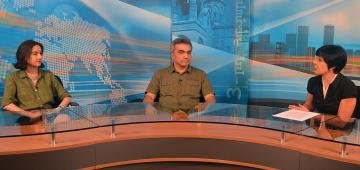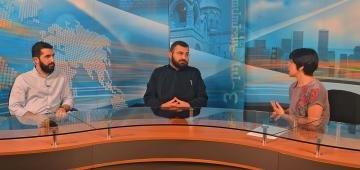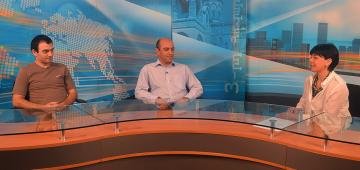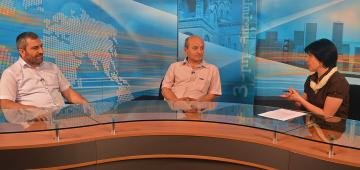|
|
The first volume of full collection of Hovhannes Tumanyan’s works was published
Towards 150th anniversary of Hovhannes Tumanyan, the presentation of the first volume of full collection of Hovhannes Tumanyan’s works was held in Tumanyan Museum.
|
 |
The Vectors of Foreign Policy of Post-Revolutionary Armenia and Inevitable Issues
What has changes in the foreign policy agenda of Armenia? Are those the vectors or the messages that have changed? Has the attitude of geopolitical centers to Armenia changed?
Expert in International Studies Anahit Shirinyan and political analyst Edgar Vardanyan discuss the topic.
The conversation is hosted by Anna Sargsyan.
|
 |
The Church and the Society: Old Connections and New Expectations
The Christian churches have often undergone public-political upheavals, revolts and revolutions. The Armenian Church is no exception. Church-society, church-state relations have sometimes been in solidarity, sometimes in cooperation, sometimes openly rejected. In the 20th century, the Bolshevik society, for example, burnt churches and shot priests. A few decades later, the same society, with the change of the social-political system, revealed that it is not only a follower of the church, but also the church is a key part of its identity and national wealth.
What is the status of church-society relationship in the 21st century? What does the Armenian society expect from the Armenian Church today?
Very Rev. Fr. Shahe Ananyan from the Mother See and expert in Oriental studies Varuzhan Geghamyan discuss the topic.
The conversation is hosted by Anna Sargsyan.
|
 |
Uncertainty of Freedom in “New” Armenia
Public-political debates continue. Some say the revolution is just beginning, some say "yes" or "no" to the counterrevolution, some say, we do not understand what is happening. What is the mood of society, what is the diagnosis of the state organism?
The subject is discussed by cultural anthropologist Smbat Hakobyan and political scientist Saro Saroyan.
|
 |
From Civil Revolt to Civil Consciousness
What implications and consequences can have this all-national movement? What achievements are already visible, how to transform the power of revolt into civil consciousness?
Hayk Hambardzumyan discussed these issues with ethnographer Mkhitar Gabrielyan.
|
 |
Political Legal System After Velvet Revolution
Velvet revolution introduced the topic of legality and law into the realm of public talks. To what extent will this potential be achieved and will the country have a political, legal and legal culture in place? The lawyer Norayr Norikyan and politician Styopa Safaryan are discussing the topic.
The conversation is hosted by Anna Sargsyan.
|
 |
Father Nerses Rushanyan
“A priest is a crown-wearing, anointed clergyman, but he must be surrounded by the trust, love and faith of believers”.
The TV program series “My Pastor” was hosted by the pastor of St. Astvatsatsin Church of Artimed village Father Nerses Rushanyan.
|
 |
Vigen Hovsepyan
Vigen moved to Spain in 2001 with his family. After graduating the school he took up music. He has played in Barselona Ethnic ensemble. He returned to Armenia after he met his future wife. “Today Yerevan has changed greatly, I hope we will soon build such an Armenia where we can invite everyone back with high spirits”.
|
 |
Diaspora and Velvet Revolution
The Diaspora also invested its time and participation in the Velvet revolution. Parallel to rallies in Armenia, marches and demonstrations took place in different communities of Armenia. What was the coverage of this support, did it cover all the layers of the Diaspora and, in general, what is the attitude towards these recent developments in the Diaspora?
Hayk Hambardzumyan talked about these issues with Dr. Vahe Sahakyan, an expert in Diaspora issues, Doctor of Oriental Studies at the University of Michigan.
|
 |
State Support of Art: Incentive or Control?
What should be the state policy in the sector of art in order to encourage creative freedom, to ensure conditions for the artist's work, but not control the artist and the content of his/her work? What is the role of creative art unions in our reality and what is the demand for their activities? Is there a need for publishing books with state support and what are those books to be published with state support?
Hayk Hambardzumyan discussed these issues with poet and translator Hakob Movses.
|
 |
History Textbook As Means of Legitimacy for the Authorities
History textbooks have critical role in shaping the historical consciousness of society. Being a state-ordered and funded book, the textbook is inevitably perceived as a propaganda tool for the authorities, an ideological battle field, and etc. Why is it so, and how was the history of the first Armenian Republic in particular, reflected in the Armenian history textbooks?
Hayk Hambardzumyan talked about this with historian Smbat Hovhannisyan.
|
 |
Not Repeating Past Mistakes
After the velvet revolution, the relations between the legislative and executive powers of the country have found themselves in a situation, where separate episodes remind of the relations between the parliament and government of the First Republic of Armenia. The political system of the first and third republics is vulnerable especially from the perspective of autocratic aspirations. At the moment there are great expectations from the new elections and the maturity of the nation to be displayed during these elections. What should we know about the past to make the future secure?
|

